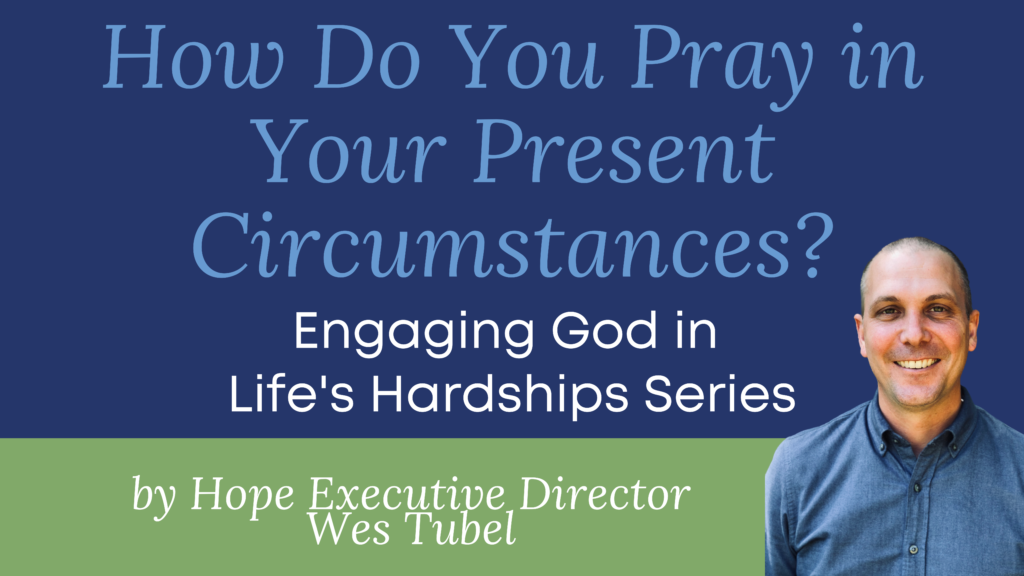Faith is not a leap into darkness and unreason in spite of cold hard facts. Faith is the honest and reasonable step in the direction of the person who can help you, given all the facts. David Powlison, Good and Angry
What does a psalm-like faith look like in the midst of life’s hardships? We are continuing our exploration of five questions that all of us can ask to better draw near to God in faith amid life’s hardships and struggles (see part one, part two, part three). Today, we will look more closely at the fourth question: How do I turn to God in faith and entru st myself to his care today, in my present circumstances.
st myself to his care today, in my present circumstances.
I love how the psalms put words on our experiences, and model for us ways to cry out to the Lord. I have been particularly helped by Psalm 13 in recent years. While we do not know the specific occasion for this particular psalm, we do know David was in anguish, and it seemed like the Lord was silent to his pleas. Join me in a brief journey though this psalm.
13:1-2 Honest questions
1 How long, O LORD? Will you forget me forever?
How long will you hide your face from me?
2 How long must I take counsel in my soul
and have sorrow in my heart all the day?
How long shall my enemy be exalted over me?
David is wrestling with God in prayer, asking him to intervene in his troubles. But the Lord seems silent. Notice the interplay between the spiritual, personal, and circumstantial elements of David’s struggle. God seems to have turned away from David (spiritual). David seems to be his only source of help (personal). And enemies seem to be getting the upper hand (circumstantial).
I think most of us can relate to times when it seemed that God was not answering. Perhaps you are going through one of those times now, and you have so many “how long” questions:
• How long will I experience this unending pain?
• How long will my wayward child refuse to turn back to God?
• How long will this besetting sin be part of my life?
• How long will I be stuck in this dead-end job?
• And perhaps the biggest question: how long until you return, O Lord, and make all things new?
Our “how longs” can lead us to think God is distant, or that he just doesn’t hear us.
13:3–4 A (seemingly) illogical plea
3 Consider and answer me, O LORD my God;
alight up my eyes, lest I sleep the sleep of death,
4 lest my enemy say, “I have prevailed over him,”
lest my foes rejoice because I am shaken.
I don’t know about you, but sometimes I have a hard time continuing to pray when God seems silent. Given the first two verses, we might give David a pass if he said “I’m tired of praying about this.” But notice the step of faith David takes. Even though God seems silent, or seems to have forgotten, or even seems to have hidden his face, David will not stop praying. “Consider and answer me, O LORD my God.” In the midst of a difficult season of struggle, David knows he must continue to cry out to the Lord. One commentator mentions (noting the flow from v 1–2 to 3–4), that David displays terrible logic…but excellent faith.
How do we have that kind of trust in God, especially when he seems silent? Verses 5 and 6 reorient our faith away from our circumstances and to who God is and what he promises.
13:5–6 A love that will not, cannot let us go
5 But I have trusted in your steadfast love;
my heart shall rejoice in your salvation.
6 I will sing to the LORD,
because he has dealt bountifully with me.
Verse 5 is the pivot point of this psalm. Circumstances have a way of unearthing all kinds of existential and spiritual crises. All of us can doubt what we know to be true in the face of what seems so uncertain. How can David continue to entrust his deepest concerns to a God who seems silent?
David trusts the Lord because of the Lord’s steadfast love. This is one of the most profound promises of God. What kind of love is that? It is a committed, steadfast, covenantally faithful love of our God. David underscores something powerful for us. Our circumstances are not our anchor. Our feelings are not our anchor. Our understanding of how God has or hasn’t answered is not our anchor. Our anchor is that God has loved us with a committed, steadfast love that will not, cannot let us go.
I do not know all you are facing today. But I’m sure that at times, life’s circumstances can seem overwhelming. What anchors our faith? It is the steadfast love of the Lord, that never ceases (Lam. 3:22). His convenantally faithful, steadfast, committed love will not fail.
Would you join me in praying Psalm 13? It may not change your circumstances. But it will draw you nearer to God, and will provide his mercy and grace in your time of need. We long for the day when Christ will return, and make all things new. And as we wait, we recognize that life is hard, and God can often feel silent. But he has promised to love us with a love that will not let us go. And that love makes all the difference.
